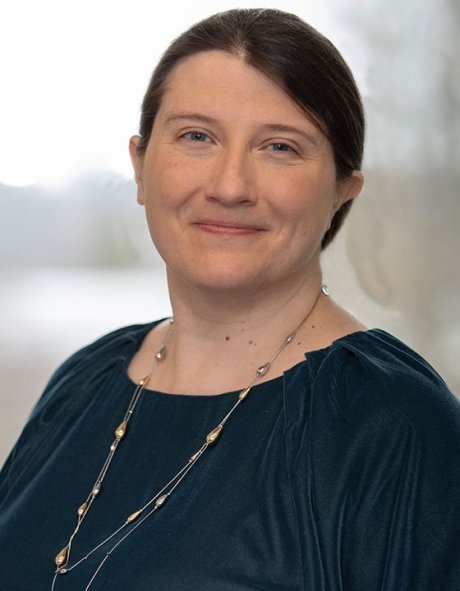Quenby Hughes, New Dean of the Faculty of Arts and Sciences
- News & Events
- News
- Quenby Hughes, New Dean of the Faculty of Arts and Sciences

Not only is Hughes a RIC alumna and daughter of two retired RIC professors, she is the first woman to serve in this role.
On June 19 RIC Professor of History Quenby Olmsted Hughes ’95 will begin her new role as Rhode Island College’s seventh dean of the Division of the Faculty of Arts and Sciences (FAS) and the first woman to serve in this role.
FAS is the largest division on campus, with 16 departments and 10 programs across the arts, humanities, sciences and social sciences. As a history major and professor of history, Hughes is a product of the FAS division.
She enrolled at RIC early – in her senior year of high school – while her father was RIC professor of philosophy (Richard Olmsted) and her mother a RIC professor of communication (Audrey Olmsted).
Being a “professor’s kid,” Hughes initially did not expect to complete her degree at RIC. Through RIC’s Student Exchange Program, she attended McGill University in Montreal, Canada, during her second year, while paying RIC tuition and fees.
“My intention was to eventually transfer to McGill, but I found that the school wasn’t for me,” she says. “The classes were massive – my smallest class had 90 students – and I was primarily taught by graduate students. It was such a change from Rhode Island College and it really reinforced for me how special Rhode Island College is. At RIC, class sizes cap at 30. All of my professors had doctorates and were active in their field. And the faculty really mentored and cared about their students.” Hughes concluded that there’s no place like home.
She earned her B.A. in history summa cum laude at RIC in 1995 and went on to complete her A.M. (1997) and Ph.D. (2003) in modern American history at Harvard University.
After earning her doctorate, Hughes initially taught part time at Harvard and at the same time at RIC. She eventually sought a tenured position at RIC because, she says, “RIC makes a real difference in students’ lives.”
“Throughout our history, we have been the place for first-generation college students. We’ve been the institution to go to for economic and social mobility. And we are immensely proud of our students who do amazing things despite incredible obstacles,” she says. “Just a little bit of support, mentoring and engagement takes our students to places they didn’t even know existed.”
Hughes has taught more than 30 different RIC courses at the undergraduate and graduate level, including interdisciplinary courses in gender studies, nongovernmental organizations and the College Honors and General Education Programs. She was also elected president of the faculty union and served on a wide variety of college committees created to help further the college’s commitment to excellence.
Her division’s primary goal, she says, is to educate students in a wide variety of liberal arts fields that have a shared emphasis on critical and creative thinking. Her division, she believes, also helps “future-proof the degrees all RIC students earn through the General Education Program.
“There’s a lot of economic uncertainty about the future,” Hughes says. “Two years ago if you graduated with a tech degree you instantly had a job. Now we’re seeing layoffs. It’s really hard to predict what our society and our economy is going to look like in the future. Research suggests that it will be through general education programs that students gain the flexibility of mind to be able to confront uncertainty and change.”
General education courses are primarily liberal arts courses that help students become skilled in research, critical thinking, analytical thinking, writing and oral communication.
“With the majority of our gen ed courses being taught by FAS faculty, we are effectively helping individuals function in an uncertain world. We teach everyone,” Hughes says. “Yet most students aren’t sure why they are required to take gen ed. That’s true at higher education institutions across the country. At RIC, I want our students to be very clear about the skills and methods of thinking they’re gaining from our gen ed program.”
“Another challenge that the liberal arts is facing is that people tend to think that the name of the major should lead to a specific job of the same name – I’m studying this, therefore I’m going to be that,” Hughes says. “That works for the professional schools, like nursing and social work, but not for the liberal arts. We need to do a better job of talking about the wide range of professions FAS majors lead to.
“I’d like to bring in FAS alumni who are working in a wide variety of fields and have them talk about how they got there, how they prepared themselves for those positions. One of our FAS faculty members, Brandon Hawk, is doing just that in a course he created called ‘Career Readiness for Humanities Majors.’ It’s designed to inspire our students about what they, too, can do with their degree.”
Overall, Hughes says she is excited about bringing the division together around the common goal of supporting RIC students, be it through academic advising, mentorships, internships and gen ed courses.
“It feels like a really good time to become dean,” she says. “There’s this broader energy of optimism at the college that I want to tap into and this wonderful momentum at the college that I want to get behind.”
Hughes replaces former dean Earl Simson, who served in that role for 15 years.
Rhode Island College looks forward to the continued success of the Division of the Faculty of Arts and Science through Hughes’ proven leadership and commitment to excellence in education.
